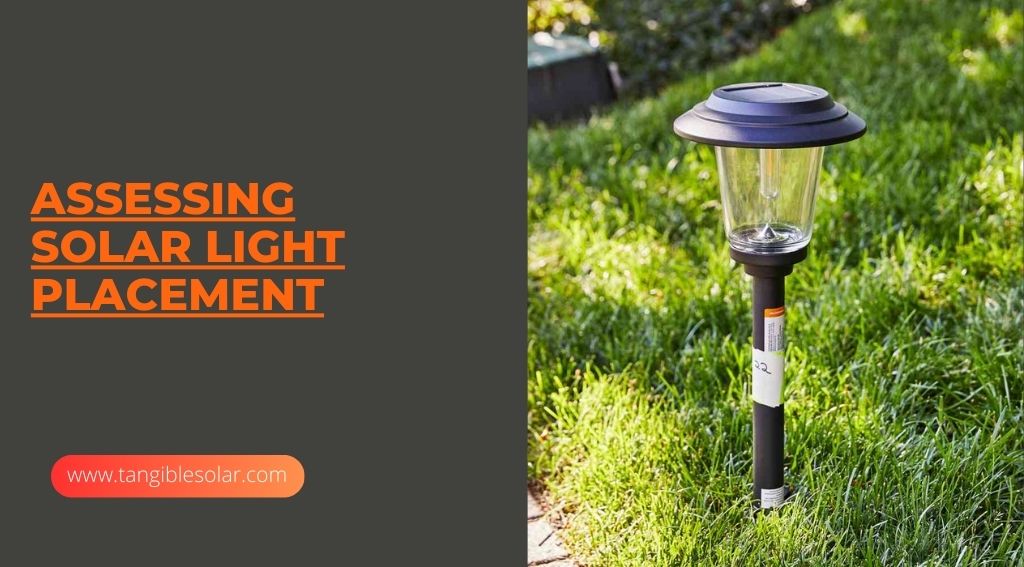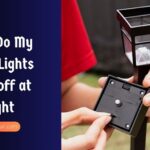How to Stop Solar Lights from Flashing: A Foolproof Guide
To stop solar lights from flashing, you can try replacing the batteries or checking the wiring connections. Additionally, ensure that the solar panel is clean and in direct sunlight for optimal charging.
Adjusting the settings on the light sensor may also help resolve the issue.
How to stop solar lights from flashing: Understanding The Issue
Solar lights flashing? Learn how to put a stop to this irritating issue by understanding the root causes and implementing effective solutions.
How to Stop Solar Lights from Blinking
Solar lights can be a beautiful addition to any outdoor space, providing an enchanting glow as the sun goes down. However, if your solar lights start flashing unexpectedly, it can be quite frustrating and can detract from the overall aesthetic.
In this section, we will explore the reasons behind solar light flashing and the impact it can have on outdoor aesthetics.
Reasons Behind Solar Lights Flashing:
- Low battery voltage: When the battery voltage drops below a certain threshold, solar lights may start to flicker or flash. This can happen due to cloudy days or insufficient sunlight to charge the batteries. When the batteries don’t receive enough energy, the lights may turn on and off or produce a flashing effect.
- Interference with other light sources: Frequently, nearby light sources can have an impact on solar lights. This could be streetlights, car headlights, or any bright artificial light that interferes with the light sensors of the solar lights. The conflicting light signals can cause the lights to flash intermittently.
- Sensor malfunction: The sensors in solar lights are responsible for detecting ambient light levels and triggering the lights to turn on or off.
Impact of Flashing Lights on Outdoor Aesthetics:
- Diminished ambiance: The flashing lights can disrupt the peaceful and calm ambiance that solar lights are meant to create in outdoor spaces. Rather than providing a warm and inviting glow, the flashing lights can be distracting and take away from the overall aesthetic appeal.
- Inconsistent lighting effects: A consistent lighting effect is crucial to maintaining a cohesive and harmonious outdoor atmosphere. When solar lights start flashing, the lighting effects become inconsistent, making the area feel disjointed and less visually pleasing.
- Reduced functionality: Flashing lights can indicate an underlying issue with the solar lights. If left unresolved, this issue may lead to the lights failing to work altogether. This not only affects the aesthetics but also diminishes the functionality of the lights, rendering them useless until the problem is fixed.
Now that we have delved into the reasons behind solar lights flashing and the impact it can have on outdoor aesthetics, let’s move on to the next section, where we will discuss potential solutions to stop solar lights from flashing.
Stay tuned!
Assessing Solar Light Placement

Ensure optimal solar light placement by following these simple steps to prevent flashing. By assessing the positioning and angle of your solar lights, you can enjoy constant, uninterrupted illumination for your outdoor spaces.
How To Connect Bluetti Solar Panels
Proper placement of solar lights is crucial to ensuring optimal functionality and preventing any flashing issues. By assessing various factors, such as sunlight exposure, shade, and obstructions, you can effectively eliminate the flashing problem. Let’s delve into the importance of correct sunlight exposure and how to evaluate shade and obstruction factors:
The Importance of Correct Sunlight Exposure:
- Solar lights rely on sunlight to charge their batteries and illuminate their surroundings during the night. Ensuring they receive sufficient sunlight exposure is vital for their performance.
- Here are key points to consider for assessing sunlight exposure:
- Direction: Place solar lights in a location that receives the most direct sunlight throughout the day. Orienting them towards the south or facing the path of the sun maximizes exposure.
- Angle: Adjust the angle of the solar panel to match the latitude of your region. Tilting the panel to an appropriate angle allows it to capture the most sunlight, especially during the winter months.
- Clearance: Avoid placing solar lights in areas with overhead obstructions such as branches or structures. Ensure there is ample clearance above to allow sunlight to reach the solar panel directly.
- Avoid excessive shadows: Be mindful of nearby objects or vegetation that may cast long shadows on the solar panel. These shadows can significantly reduce the amount of sunlight the panel receives.
- Regular cleaning: Keep the solar panel clean from dust, debris, and any other potential obstructions. Regular cleaning ensures maximum sunlight absorption.
Evaluating Shade and Obstruction Factors:
- Shade and obstructions can severely impact the performance of solar lights. Consider the following factors when evaluating shade and obstructions:
- Observe throughout the day: Monitor the area where you intend to install solar lights at different times throughout the day. Take note of any shade patterns caused by nearby trees, buildings, or structures.
- Identify shade duration: Determine the duration and intensity of shade that affects the solar panel. If the area experiences prolonged shade periods, consider alternative placement options with better exposure to sunlight.
- Reposition or trim: If shading is unavoidable, consider repositioning the lights or trimming nearby vegetation to minimize the impact of shade on the solar panel.
- Reflective surfaces: Be cautious of highly reflective surfaces near the solar lights, as they can cause interference or false light detection. Adjust the angle or position of the lights to mitigate any issues caused by reflections.
- Evaluate seasonal changes: Some areas may experience more shade or obstructions during certain seasons. Assess the shade and obstruction factors accordingly, making necessary adjustments to maintain optimal sunlight exposure.
By carefully assessing solar light placement, focusing on correct sunlight exposure, and evaluating shade and obstruction factors, you can effectively prevent flashing issues and ensure your solar lights perform at their best.
Checking Solar Light Batteries
Ensure your How to Stop Solar Lights from Flashing is functioning optimally by checking and preventing them from flashing. Follow these steps to stop your solar lights from flickering and enjoy consistent, steady illumination all night long.
How to Reset Solar Lights
One of the main culprits behind flashing solar lights is weak or deteriorating batteries. By checking and maintaining the batteries properly, you can ensure that your solar lights function optimally. Here are a few crucial steps to follow:
Testing battery strength and voltage:
- Use a multimeter: Investing in a multimeter is a wise decision as it allows you to check the strength and voltage of your solar light batteries. This tool measures the electrical current flowing through the battery and provides accurate readings.
- Set the multimeter: Switch the multimeter to the DC voltage setting and set the range to a suitable level (usually around 20 volts).
- Connect the multimeter. First, identify the positive and negative terminals of the battery by referring to the manufacturer’s instructions. Then, connect the red (positive) lead from the multimeter to the positive terminal of the battery, and the black (negative) lead to the negative terminal.
- Read the voltage: Once the connections are secure, read the voltage displayed on the multimeter. A fully charged battery typically reads around 1.2 to 1.5 volts for a rechargeable NiMH battery and 1.5 volts for an alkaline battery.
- Compare the readings: If the voltage is significantly lower than the expected range, the battery is likely discharged or deteriorated and may need replacement.
Signs of battery deterioration:
- Dim or flickering lights: If you notice that your solar lights are no longer as bright or that they flicker intermittently, it could be an indication of battery deterioration.
- Reduced lighting duration: Solar lights with deteriorating batteries may not be able to provide consistent lighting throughout the night. If the lights turn off too early, the battery might need replacement.
- Corrosion or leakage: Check the battery compartment for any signs of corrosion, leakage, or damage. These issues can impact the performance of the battery and the solar light overall.
- Age of the battery: Keep in mind that batteries have a limited lifespan. If your How to Stop Solar Lights from Flashing has been in use for several years without replacement, it’s worth considering fresh batteries.
By regularly testing the battery strength and being alert to signs of deterioration, you can effectively prevent flashing solar lights. Maintain your solar light batteries to ensure reliable and long-lasting illumination in your outdoor space.
Replacing Solar Light Batteries
Looking to stop flashing your solar lights? One effective solution is to replace the batteries. By following a few simple steps, you can ensure that your solar lights stay steady and bright, enhancing your outdoor space.
Solar lights are a great addition to any outdoor space, providing a soft and ambient glow. However, it can be frustrating when these lights start flashing unexpectedly. One common cause of this issue is a faulty battery. In this section, we will guide you through the process of replacing the battery in your solar lights, ensuring they shine brightly once again.
Step-by-step battery replacement process:
- Start by turning off the solar light and removing it from its current position.
- Locate the battery compartment, typically located on the bottom or back of the light.
- Open the battery compartment by unscrewing the lid or sliding it open.
- Carefully remove the worn-out battery from the compartment, taking note of its orientation (positive and negative ends).
- Dispose of the old battery properly, following the recycling guidelines in your area.
- Select a suitable replacement battery for your solar light. It is important to choose the right type of battery to ensure optimal performance. Some recommended battery types for solar lights include:
- Ni-MH (Nickel-Metal Hydride) batteries: These are a popular choice for solar lights, offering a good balance between cost and performance. They can handle frequent charging and discharging cycles, making them suitable for outdoor use.
- Li-ion (lithium-ion) batteries: These batteries are known for their high energy density and long lifespan. While they may be more expensive, they provide excellent performance and durability.
- LiFePO4 (Lithium Iron Phosphate) batteries: These batteries are a newer technology and offer superior performance compared to other types. They have a longer lifespan, a higher capacity, and are better suited to extreme weather conditions.
- Insert the new battery into the compartment, making sure to align it correctly with the positive and negative terminals.
- Close the battery compartment securely to protect the battery from water and dust.
- Place the solar light back in its desired location, ensuring it receives ample sunlight to charge the new battery.
- Finally, turn on the solar light and enjoy its uninterrupted glow.
Remember, regular maintenance and timely battery replacements are essential for the proper functioning of your solar lights. By following these simple steps and selecting the appropriate battery type, you can ensure your solar lights remain dazzling all night.
Cleaning Solar Panels

Keep your solar lights working efficiently by keeping the panels clean. Prevent flashing issues with these simple steps for cleaning solar panels.
Importance Of Clean Solar Panels
Proper maintenance and cleaning of solar panels are crucial for optimal performance and efficiency. When solar panels are covered in dirt, dust, or debris, they can’t effectively absorb sunlight, resulting in a decrease in energy production. By keeping your solar panels clean, you can maximize their efficiency and ensure they continue generating clean, renewable energy.
Here are some key points to consider:
- Regular cleaning: Solar panels are constantly exposed to the elements, including dust, pollen, bird droppings, and other debris. Regular cleaning helps to remove these contaminants and prevents them from reducing solar panel efficiency.
- Enhanced energy output: Clean solar panels have a higher absorption capacity, enabling them to convert more sunlight into electricity. This means better energy output and increased savings on your electricity bills.
- Prolonged lifespan: By reducing the accumulation of dirt and grime on solar panels, you can extend their lifespan. Cleaning helps to prevent corrosion, deterioration, and potential damage caused by long-term exposure to pollutants.
- Environmental benefits: Solar energy is a clean and renewable source of power. By ensuring your solar panels are clean and functioning optimally, you contribute to a greener environment by reducing your carbon footprint.
To maintain the efficiency of your solar panels and enjoy all these benefits, it’s essential to clean them properly and safely. Let’s explore some methods and precautions you can take to ensure efficient and hassle-free cleaning.
Safely Cleaning Solar Panels
Keeping safety in mind is crucial when cleaning solar panels. Follow these steps to maintain the efficiency of your solar panels without risking damage or injury:
- Safety first: Before starting the cleaning process, ensure your safety. Wear appropriate protective gear such as gloves, safety goggles, and non-slip footwear to prevent accidents.
- Check manufacturer’s instructions: Read the manufacturer’s guidelines or installation manual provided with your solar panels. Some manufacturers may have specific instructions for cleaning their panels, which you should adhere to for optimal results.
- Time it right: Choose a time when the panels are cool and not exposed to direct sunlight. Cleaning hot panels can lead to rapid evaporation of cleaning solutions, leaving behind streaks or residue.
- Gather the essentials: Before cleaning, collect all the necessary supplies, including a soft brush or sponge, a non-abrasive cleaning solution (avoid harsh chemicals), a bucket of warm water, and a hose or a spray bottle.
- Gentle cleaning: Start by rinsing the solar panels with plain water using a hose or spray bottle. This will help loosen any dirt or debris. Avoid using high-pressure water, as it may damage the panels.
- Use a non-abrasive cleaning solution: Mix a mild detergent or specialized solar panel cleaner with warm water in a bucket. Dip the soft brush or sponge into the cleaning solution and gently scrub the panels in a circular motion, removing any remaining dirt or grime.
By following these cleaning tips and precautions, you can ensure that your solar panels remain clean and efficient, maximizing their energy production and contribution to a sustainable future.
Adjusting Solar Light Settings
If you want to stop your solar lights from flashing, adjusting the settings is crucial. By following a few simple steps, you can easily resolve this issue and ensure steady and constant illumination in your outdoor space.
How To Make Solar Lights Stay On Longer
Experiencing flashing solar lights can be frustrating, but fret not! By adjusting your solar light settings, you can put an end to this issue and enjoy consistent illumination. In this section, we will explore the different light mode options and how to change the settings to minimize flashing.
Let’s get started!
Examining Light Mode Options:
- Steady Mode: This mode keeps your solar lights continuously lit throughout the night. It offers a consistent level of brightness, ensuring a reliable source of light for your outdoor spaces.
- Sensor Mode: In this mode, solar lights will only activate when they detect motion. This energy-saving option helps extend the battery life of your solar lights while providing illumination when needed.
Changing Settings to Reduce Flashing:
- Check the battery. A low or failing battery can cause inconsistent performance and flashing. Replace the old batteries with new ones to ensure uninterrupted operation.
- Positioning: Properly positioning your solar lights is crucial to maximizing their efficiency. Ensure that they are placed in an area where they receive direct sunlight for optimal charging. This will aid in preventing flashing brought on by insufficient energy.
- Adjust sensitivity settings: Some solar lights come with sensitivity settings that control how easily they detect motion. By reducing the sensitivity level, you can minimize false triggers and reduce the chances of flashing.
- Time delay settings: Solar lights with time delay settings allow you to adjust how long the light remains on after detecting motion. Increasing the time delay can help prevent flashing, as the light will stay on longer.
- Clean the solar panel: Dust, dirt, and debris can accumulate on the solar panel, hindering its ability to absorb sunlight effectively. Regularly cleaning the panel ensures maximum efficiency, reducing the likelihood of flashing.
- Reset the light: If all else fails, try resetting your solar lights. This action often resolves software or configuration issues that may be causing flashing. Consult the manufacturer’s instructions on how to perform a reset.
By exploring different light mode options and adjusting the settings of your solar lights, you can effectively mitigate flashing issues. Keep in mind that the effectiveness of your solution may vary depending on the model and brand of your solar lights. Enjoy consistent, reliable illumination by fine-tuning your solar light settings today!
Inspecting Solar Light Components
Inspecting solar light components can help resolve the issue of flashing lights. By checking the battery, panel, and connections, you can ensure that your solar lights are working efficiently and consistently.
How to Make Solar Garden Lights Brighter
When it comes to solar lights flashing, it is essential to inspect the various components to identify any damaged or faulty parts. By doing so, you can pinpoint the cause of the issue and take appropriate steps to rectify it.
Here’s a checklist to help you with the inspection process:
- Solar Panel:
- Check if the solar panel is clean and free from any dirt, dust, or debris.
- Ensure that the panel is properly aligned toward the sun for maximum exposure.
- Inspect the panel for any cracks or physical damage.
- Battery:
- Determine if the battery is fully charged or needs replacement.
- Examine the battery connections and terminals for corrosion or loose connections.
- Replace the battery if it is visibly damaged or no longer holds a charge.
- LED Bulb:
- Inspect the LED bulb for any signs of malfunction, such as flickering or dimming.
- Ensure that the bulb is securely connected to the wiring and socket.
- Replace the bulb if it is damaged or has reached the end of its lifespan.
- Wiring and connections:
- Carefully examine the wiring and connections for any frayed or exposed wires.
- Check for loose or disconnected wires that may disrupt the circuit.
- Use electrical tape or connectors to fix any damaged wiring or loose connections.
- Light Sensor:
- Ensure that the light sensor is clean and not obstructed by any objects.
- Test the sensor by covering it to see if the light turns on automatically.
- If the sensor is faulty, consider replacing it to restore proper functionality.
Purchasing and replacing components:
Once you have identified any damaged or faulty parts, it is important to purchase and replace them accordingly. Here are some guidelines to help you through the process:
- Research and identify compatible parts:
- Conduct thorough research to find the correct replacement parts for your specific solar light model.
- Take note of the specifications and compatibility requirements to ensure a proper fit.
- Purchase from Reliable Sources:
- Buy components from reputable suppliers or manufacturers to guarantee their quality and authenticity.
- Consider reading customer reviews or seeking recommendations to find reliable sources.
- Installation and replacement:
- Carefully follow the manufacturer’s instructions for installing and replacing the components.
- Take necessary safety precautions, such as turning off the power source, before handling any electrical components.
- Test and observe:
- Once you have replaced the components, test the solar light to ensure that the flashing issue has been resolved.
- Observe the light’s performance over the next few days to ensure that it functions smoothly.
Remember, inspecting the solar light components and purchasing appropriate replacements are vital steps in stopping solar lights from flashing. By following these guidelines, you can restore the functionality and effectiveness of your solar lights.
Maintaining Solar Light Circuitry
To prevent solar lights from flashing, it is important to maintain the circuitry. Regularly check the connections, clean the solar panels, and replace faulty components. By doing so, you can ensure consistent and reliable lighting from your solar lights.
Do Solar Lights Need Direct Sunlight
If you’re tired of your solar lights constantly flashing and want to find a solution to this annoying problem, understanding and maintaining the circuitry of these lights will be of utmost importance. By familiarizing yourself with the basics of circuitry and troubleshooting common issues, you can easily solve the flashing problem and ensure that your How to Stop Solar Lights from Flashing operates smoothly.
Read on to discover how to maintain the circuitry of your solar lights effectively.
Understanding Circuitry Basics:
- Wiring connections: Ensure that all wiring connections are secure and free from any damage that may cause intermittent flashing. Check for loose connections or exposed wiring that may create a short circuit.
- Solar panel functionality: Inspect the solar panel for any signs of damage or dirt accumulation that could decrease its efficiency. Clean the panel regularly to maximize its ability to convert sunlight into electricity.
- Battery check: Make sure the battery is adequately charged and functioning properly. Check the battery terminals for corrosion and clean them if necessary. Replace the battery if it is old or worn out.
- Light sensor calibration: Verify that the light sensor is properly calibrated to detect darkness and activate the lights. Adjust the sensor’s sensitivity according to your preference or the recommended settings.
- Switch functionality: Ensure that the switch is in the correct position, allowing the lights to operate as desired. Test the switch by toggling it on and off to ensure it is functioning correctly.
Troubleshooting and Repairing Common Circuit Issues:
- Insufficient sunlight: If your lights are flashing due to insufficient sunlight, relocate them to a brighter area or trim any nearby vegetation that may be shading the solar panel.
- Faulty wiring: Check the wiring for any signs of damage, such as fraying or exposed wires. Replace any faulty wiring and secure connections to ensure a reliable circuit.
- Battery issues: If the battery is not holding a charge or is consistently draining quickly, consider replacing it with a new one. Ensure that the replacement battery matches the specifications of your solar light.
- Sensor malfunction: If the light sensor is not working correctly, recalibrate it following the manufacturer’s instructions. If calibration doesn’t resolve the issue, you may need to replace the sensor.
- Environmental factors: Extreme temperatures or water damage can affect the circuitry of your solar lights. Protect them from harsh weather conditions by placing them in a sheltered location or using weatherproofing techniques.
By understanding the basics of circuitry and troubleshooting common issues, you can maintain the circuitry of your solar lights effectively and put an end to flashing lights. Regular inspection and maintenance will ensure that your solar lights operate reliably, illuminating your outdoor space without any interruptions.
So, follow these steps and enjoy the steady glow of your solar lights all year round.
Protecting Solar Lights From Weather
Protect your solar lights from flashing by taking precautions against adverse weather conditions. By providing adequate protection and maintenance, you can extend the life of your solar lights and ensure consistent, reliable performance.
Shielding Lights Against Rain, Snow, And Extreme Temperatures
Weather can significantly impact the performance and longevity of solar lights. Rain, snow, and extreme temperatures can cause flickering or even permanent damage to these outdoor fixtures. Fortunately, there are several measures you can take to protect your solar lights and ensure they continue to shine brightly.
Here’s how you can shield your solar lights against the whims of Mother Nature:
- Choose weatherproof solar lights. Start by selecting solar lights that are specifically designed to withstand different weather conditions. Look for lights with an IP rating, which indicates their resistance to dust and water. A higher IP rating, such as IP65 or IP67, means better protection against rain and moisture.
- Inspect and clean regularly: Regularly inspect your solar lights for any signs of damage or dirt accumulation. Clean the solar panels with a soft cloth or sponge to remove any debris that may obstruct sunlight absorption. Keeping the panels clean will ensure maximum energy conversion and prevent flickering.
- Position strategically: Proper positioning of solar lights can also help protect them from weather-related issues. Avoid placing them in areas prone to water accumulation, as this can lead to damage. Ensure that the solar panels are positioned to receive direct sunlight for optimal charging.
- Install protective casing or shelter: Consider installing a protective casing or shelter over your solar lights to shield them from rain, snow, and extreme temperatures. This can be as simple as placing them under a canopy or eave or using specially-designed protective covers. Protective casings or shelters can provide an extra layer of defense against the elements and prolong the lifespan of your solar lights.
Enhancing Solar Light Performance
Enhance the performance of your solar lights by preventing flashing. Discover effective methods to stop your solar lights from flickering and ensure consistent illumination for outdoor spaces.
Solar lights are a great way to illuminate your outdoor spaces, but sometimes they can be a bit finicky. If you’re tired of dealing with flashing solar lights, don’t fret! There are several ways you can enhance the performance of your solar lights to ensure they provide consistent and reliable lighting.
Here are a few tips to get you started:
Upgrading Solar Light Components
To improve the performance of your solar lights and prevent them from flashing, consider upgrading the following components:
- Batteries: Replace the old batteries in your solar lights with high-quality rechargeable batteries. Opt for NiMH (Nickel Metal Hydride) or lithium batteries, as they have longer life spans and better performance in low-light conditions.
- Solar panels: Over time, solar panels can become dirty or damaged, affecting their efficiency. Thoroughly clean the solar panels and check for any cracks or damage. If necessary, replace the solar panels with new ones to ensure optimal performance.
- LED bulbs: Upgrading the LED bulbs in your solar lights can greatly improve their brightness and overall performance. Look for energy-efficient, long-lasting LED bulbs that are specifically designed for outdoor use.
- Light sensors: Malfunctioning light sensors can cause solar lights to flash or not work at all. Check the sensors and make sure they are clean and unobstructed. If the sensors are damaged or not functioning properly, replace them with new ones.
Utilizing External Power Sources For Consistent Lighting
In addition to upgrading the components of your solar lights, you can also consider using external power sources to ensure consistent lighting, especially during periods of limited sunlight. Here are a few options to consider:
- Battery backup: Install a battery backup system that can store excess solar energy during the day and provide power to your solar lights at night. This will ensure continuous lighting even during cloudy days or extended periods of low sunlight.
- AC power adapter: Some solar lights come with the option to connect them to an AC power adapter. This allows you to switch to conventional electric power when needed, providing a reliable source of energy for your lights.
- Hybrid solar lights: Consider investing in hybrid solar lights that combine solar power with traditional electricity. These lights can automatically switch to electric power when solar energy is insufficient, ensuring uninterrupted lighting regardless of weather conditions.
By upgrading your solar light components and utilizing external power sources, you can enhance the performance of your solar lights and prevent them from flashing. With these tips, you’ll be able to enjoy consistent and reliable outdoor lighting throughout the year.
Utilizing Light Diffusers
Stop solar lights from flashing by utilizing light diffusers. These devices help to evenly distribute the light and reduce glare, ensuring a steady and pleasant illumination in your outdoor areas.
Reducing Excessive Light Output For Stability:
When it comes to addressing the issue of flashing solar lights, utilizing light diffusers can be an effective solution. These diffusers help to reduce excessive light output from the solar lights, providing stability and preventing the lights from flashing. Here are some ways you can make use of light diffusers to stop the flashing:
- Install diffusers that are designed specifically for solar lights, as they are created to provide optimal performance and stability.
- Ensure that the diffusers are compatible with the type and size of your solar lights to achieve the desired effect.
- Place the diffusers strategically to evenly distribute the light emitted by the solar lights.
- Use diffusers made of materials that are suitable for outdoor use to withstand various weather conditions.
- Opt for diffusers that have adjustable settings, allowing you to control the intensity of the light output.
- Consider diffusers with built-in filters or lenses that can help to disperse the light more evenly and reduce any glare.
By following these steps and effectively installing diffusers, you can stabilize the light output of your How to Stop Solar Lights from Flashing and prevent them from flashing.
Seeking Professional Assistance
Looking for professional assistance on How to Stop Solar Lights from Flashing? Get expert guidance and solutions to resolve this issue and enjoy uninterrupted illumination in your outdoor space.
Knowing When To Call In An Expert
Solar lights are a great way to illuminate your outdoor space while conserving energy. However, sometimes even the best DIY troubleshooting methods may not be enough to fix a persistent flashing issue. In such cases, it may be necessary to seek professional assistance.
Here are a few situations to help you determine when it’s time to call in an expert:
- Continuing flashing despite battery replacement: If you have replaced the batteries in your solar lights and they continue to flash, it could indicate a more complex issue that requires professional expertise.
- Persistent flashing after cleaning: If you have thoroughly cleaned your solar lights and they continue to flash, it might be a sign of an underlying electrical problem that a professional can diagnose and resolve.
- Damage to solar panels or wiring: If you notice visible damage to the solar panels or wiring of your lights, it’s best to have a professional assess the situation. They can determine the extent of the damage and suggest the most appropriate solution.
- Limited technical knowledge: If you are not familiar with the technical aspects of solar lights or lack the expertise to troubleshoot complex issues, it is recommended to consult a qualified technician. They can identify the source of the problem and implement the necessary repairs.
Remember, seeking professional assistance ensures that your solar lights are fixed correctly and helps prevent further damage.
Frequently Asked Questions On How To Stop Solar Lights From Flashing
How Do I Stop My Solar Lights From Flashing?
To stop your solar lights from flashing, try resetting the batteries or cleaning the solar panels for optimal performance.
Why Are My Solar Lights Flashing On And Off?
Solar lights may flash on and off due to low battery power, insufficient sunlight exposure, or a faulty sensor. Troubleshoot these issues to fix the problem.
What Is Causing My Solar Lights To Flicker?
Flickering solar lights can be caused by loose connections, damaged wires, or a faulty LED bulb. Inspect and fix these components to eliminate flickering.
How Can I Improve The Performance Of My Solar Lights?
To enhance the performance of your solar lights, ensure they receive maximum sunlight exposure, clean the solar panels regularly, and replace old batteries if necessary.
Can Extreme Weather Affect Solar Light Flashing?
Extreme weather conditions, such as heavy rain or snow, can impact the performance of solar lights and cause them to flash or flicker. Protect them from harsh conditions for optimal functionality.
Do All Solar Lights Flash?
Not all solar lights flash. The flashing feature is usually optional and can be turned on or off depending on the model. Check the instructions or settings of your solar light to determine if it has a flashing mode.
Conclusion
By following these simple tips, you can put an end to the annoying flashing of your solar lights. First, ensure that the battery is fully charged and properly inserted into the light. Secondly, check for any obstructions that may be interfering with the photocell or motion sensor.
Cleaning the panel regularly will also help to improve the overall performance of your solar lights. Additionally, positioning your lights to receive maximum exposure to sunlight during the day will ensure they have enough power to illuminate your outdoor space at night.
Finally, if these steps do not solve the problem, it may be worth considering upgrading to higher-quality solar lights or consulting a professional for further assistance. Taking these proactive measures will help you enjoy the full benefits of your solar lights, without the frustrating flashing.




